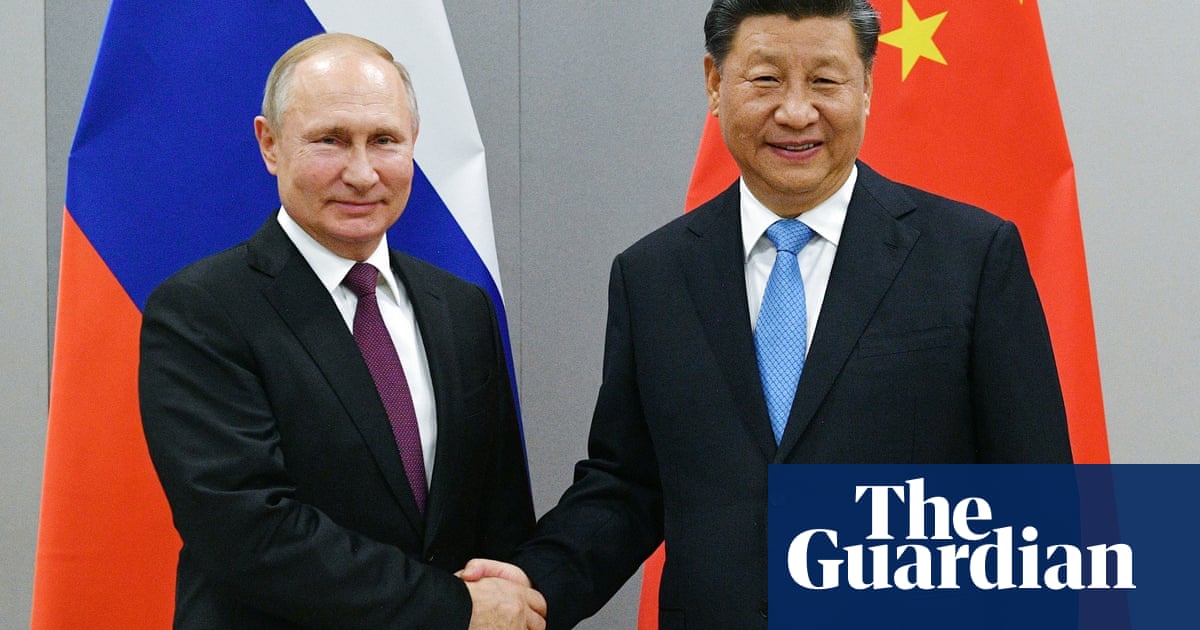
China’s Xi Jingping and Vladimir Putin of Russia have signed a joint statement calling on the west to “abandon the ideologised approaches of the cold war”, as the two leaders showcased their warming relationship ahead of the Beijing Olympics.
In a joint statement released by the Kremlin, Putin and Xi called on Nato to rule out expansion in eastern Europe, denounced the formation of security blocs in the Asia-Pacific region, and criticised the Aukus trilateral security pact between the United States, United Kingdom and Australia.
The two countries also pledged to step up cooperation to thwart “colour revolutions” and external interference.
The statement shows how China and Russia have increasingly found common interest in their respective conflicts with western powers, analysts say.
“The parties oppose the further expansion of Nato, call on the North Atlantic alliance to abandon the ideologised approaches of the cold war, respect the sovereignty, security and interests of other countries, the diversity of their civilisational and cultural-historical patterns, and treat the peaceful development of other states objectively and fairly,” the document read.
In a nod to Russian interests in Ukraine, China said it “understands and supports the proposals put forward by the Russian Federation on the formation of long-term legally binding security guarantees in Europe,” the document read.
At the same time, it addressed Chinese concerns about US-led trade and security alliances in its own region.
“The parties oppose the formation of closed bloc structures and opposing camps in the Asia-Pacific region, and remain highly vigilant about the negative impact of the US Indo-Pacific strategy on peace and stability in this region,” it read.
“We are working together to bring to life true multilateralism,” Xi told Putin, according to the Kremlin translation of their remarks. “Defending the real spirit of democracy serves as a reliable foundation for uniting the world in overcoming crises and defending equality.”
Xi has not left China since January 2020, when the country was grappling with its initial Covid-19 outbreak and locked down the central city of Wuhan where the virus was first detected.
He is preparing to meet more than 20 leaders as Beijing kicks off a Winter Olympics it hopes will be a soft-power triumph and shift focus away from a buildup blighted by a diplomatic boycott and Covid fears.
Putin’s jet touched down in the Chinese capital on Friday afternoon, state broadcaster CCTV reported.
He will meet Xi before their nations release a joint statement reflecting their “common views” on security and other issues, a top Kremlin adviser said at a Wednesday press briefing.
The pair will then attend the Olympic opening ceremony in the evening.
Spiralling tensions with the west have bolstered ties between the world’s largest nation and its most populous. Putin was the first foreign leader to confirm his presence at the Olympics.
“I have known President Xi Jinping for a long time,” CCTV quoted Putin as saying in a report on Friday. “As good friends and politicians who share many common views on solving world problems, we have always maintained close communication.”
China’s state-run Xinhua news agency also carried an article from Putin on Thursday in which the Russian leader painted a portrait of two neighbours with increasingly shared global goals.
“Foreign policy coordination between Russia and China is based on close and coinciding approaches to solving global and regional issues,” Putin wrote.
He also hit out at US-led diplomatic boycotts of the Beijing Olympics that were sparked by China’s human rights record.
“Sadly, attempts by a number of countries to politicise sports for their selfish interests have recently intensified,” Putin wrote, calling such moves “fundamentally wrong”.
For its part, China has become more vocal in backing Russia in its dispute with Nato powers over Ukraine.
Last week, China’s foreign minister, Wang Yi, called Russia’s security concerns “legitimate”, saying they should be “taken seriously and addressed”.
Moscow is looking for support after its deployment of 100,000 troops near its border with Ukraine prompted western nations to warn of an invasion and threaten “severe consequences” in response to any Russian attack.
China enjoyed plentiful support from the Soviet Union – the precursor to the modern Russian state – after the establishment of Communist rule in 1949, but the two socialist powers later fell out over ideological differences.
Relations got back on track as the cold war ended in the 1990s, and the pair have pursued a strategic partnership in recent years that has seen them work closely on trade, military and geopolitical issues.
Those bonds have strengthened further during the Xi Jinping era, at a time when Russia and China find themselves increasingly at odds with western powers.
Other leaders set to enjoy Xi’s hospitality during the Games include Egypt’s Abdel Fattah al-Sisi, Saudi Arabia’s Mohammed bin Salman, Kassym-Jomart Tokayev of Kazakhstan and Poland’s Andrzej Duda.
About 21 world leaders are expected to attend the Games. A majority of those leaders rule over non-democratic regimes, according to the Economist Intelligence Unit’s Democracy Index, with 12 labelled either “authoritarian” or a “hybrid regime”.

